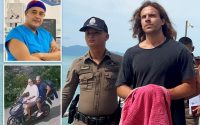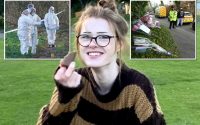Biden shares fishy tale about newspaper reporter confiding in him
WASHINGTON — President Biden shared a suspicious story Thursday about a “major newspaper” reporter who supposedly confided in him — despite failing to give any interviews with reporters from high-profile publications since taking office.
Biden, 80, has ruffled feathers among the press by not giving a single on-the-record interview as president to a newspaper reporter — and he regularly draws negative attention for his relatively infrequent interviews of any sort, save for a few TV sit-downs.
The president told the tale during a rare live interview with MSNBC host Nicolle Wallace, a reliably pro-Democratic pundit who formerly served as Republican President George W. Bush’s 2004 campaign communications director and then as Bush’s White House communications director.
“This is not a criticism of the press, it’s an observation,” Biden began. “There’s a lot to be worried about around the world and talking to a lot of reporters, they tell me — I’m going to be careful what I say here — a number of reporters have indicated that there’s no editors anymore on what they do.
“And I had one reporter tell me that, you know, ‘I’m a reporter, but I got my — one of my editors at the newspaper who came to me and said ‘you don’t have a brand yet.’

“I mean, even at a major newspaper. And he said, ‘Well, I’m not an editorial writer.’ Well, you need a brand so people will watch you, listen to you because of what they think you’re going to say,” Biden said.
“And I just think there’s a lot changing.”
The story was a tangent while Biden was reminiscing about inaccurate press predictions that Democrats would lose a large number of seats in Congress in the 2022 midterm elections.
Biden has been interviewed by the Associated Press, which is carried by many newspapers, but the news wire is known for seeking to steer clear of personal journalist branding. He has also given interviews, some of them off the record, to newspaper opinion columnists, who by nature of their work have carefully cultivated personal brand.

Biden has for decades told stories of questionable accuracy — often in an apparent attempt to relate to his audiences. His tendency to do so as president has bolstered questions about his mental acuity as he seeks a second four-year term.
During his first year in office, Biden told Jewish leaders that he remembered “spending time at” and “going to” Pittsburgh’s Tree of Life synagogue in 2018 after the worst anti-Semitic attack in US history, in which 11 people were murdered. The synagogue said he never visited and the White House later said he was thinking about a 2019 phone call to the synagogue’s rabbi.
Later that month, Biden told an Idaho audience that his “first job offer” came from local lumber and wood products business Boise Cascade. The company said it was news to them.

LBiden told students at historically black colleges in Atlanta last year that he was arrested multiple times while protesting in favor of civil rights — another claim for which there is no evidence.
Biden said at the Naval Academy’s graduation ceremony last May that he was appointed to the military school in 1965 by the late Sen. J. Caleb Boggs (R-Del.). A search of Boggs’ archives failed to turn up evidence of the appointment. He told a slightly different version of the story this month.
At least eight times as president, Biden told a chronologically impossible tale involving a former Amtrak conductor to underscore his love of passenger rail.

Biden dropped out of his first presidential campaign in 1987 due to a scandal involving plagiarism of speeches and a law school paper. Biden infamously borrowed British politician Neil Kinnock’s family history — with Biden changing geographic details to falsely claim in speeches that “my ancestors… worked in the coal mines of Northeast Pennsylvania and would come up after 12 hours and play football for four hours.”
Unlike Kinnock, Biden’s ancestors did not mine coal.
Biden also falsely claimed during that election that he “graduated with three degrees from college,” was named “the outstanding student in the political science department,” “went to law school on a full academic scholarship — the only one in my class to have a full academic scholarship” and ”ended up in the top half” of his class. None of those claims were true.


